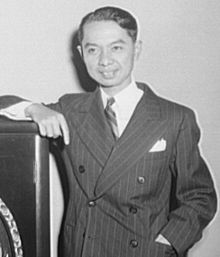Seni Pramoj
|
Mom Rajawongse Seni Pramoj |
|
|---|---|
| หม่อมราชวงศ์เสนีย์ ปราโมช | |
 |
|
| 6th Prime Minister of Thailand | |
|
In office 17 September 1945 – 31 January 1946 |
|
| Monarch | Ananda Mahidol |
| Preceded by | Tawee Boonyaket |
| Succeeded by | Khuang Abhaiwongse |
|
In office 15 February 1975 – 13 March 1975 |
|
| Monarch | Bhumibol Adulyadej |
| Preceded by | Sanya Dharmasakti |
| Succeeded by | Kukrit Pramoj |
|
In office 20 April 1976 – 6 October 1976 |
|
| Preceded by | Kukrit Pramoj |
| Succeeded by | Thanin Kraivichien |
| 1st Leader of the Opposition in House of Representatives of Thailand | |
|
In office 22 March 1975 – 12 January 1976 |
|
| Monarch | Bhumibol Adulyadej |
| Preceded by | None, Office created |
| Succeeded by | Pramarn Adireksarn |
| Personal details | |
| Born |
26 May 1905 Nakhon Sawan, Siam |
| Died | 28 July 1997 (aged 92) Bangkok Hospital, Huai Khwang, Bangkok, Thailand |
| Nationality | Thai |
| Political party | Democrat Party |
| Other political affiliations |
Free Thai Movement |
| Spouse(s) | Utsana Saligupta |
| Children | 3 |
| Alma mater | Worcester College, Oxford |
| Profession | Lawyer |
| Religion | Theravada Buddhism |
| Signature | |
Mom Rajawongse Seni Pramoj (26 May 1905 – 28 July 1997) (Thai: หม่อมราชวงศ์เสนีย์ ปราโมช, rtgs: Seni Pramot, pronunciation: [sěː.niː praː.môːt]) was three times the prime minister of Thailand and a politician in the Democrat Party. A member of the Thai royal family, he was the great-grandson of King Rama II.
Born a son of His Highness Prince Khamrob and mother Daeng (Bunnag), he was educated at Trent College in Derbyshire before obtaining a BA second class honours degree in jurisprudence from Worcester College, Oxford. He continued his studies at Gray's Inn, London, receiving first honours. After returning to Thailand he studied Thai Law, and following six months as a trainee at the Supreme Court, he started to work at the Justice Civil Court. Later, he was transferred to the Foreign Ministry and in 1940 was sent to the United States as Thai ambassador.
Japanese forces invaded Thailand early on the morning of 8 December 1941, shortly after the attack on the United States at Pearl Harbor, Hawaii. The Prime Minister, Field Marshal Plaek Phibunsongkhram, ordered a ceasefire at noon, entering into an armistice that allowed the Japanese to use Thai military installations in their invasion of Malaya and Burma. On 21 December, a formal military alliance with Japan was concluded.
...
Wikipedia
